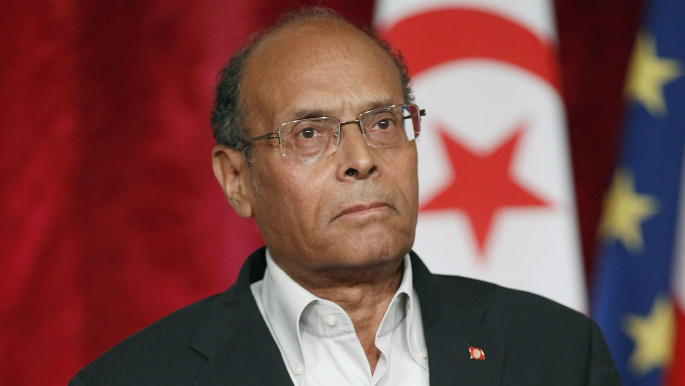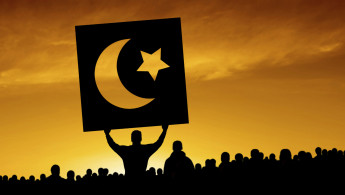Special coverage of the Jasmine revolution's fourth anniversary
Special coverage of the Jasmine revolution's fourth anniversary
When a local fruit-seller could take no more humiliation at the hands of an oppressive state, few could have predicted his fire would spread from Tunisia across the Arab world.
3 min read
When he found he could take no more of the daily humiliations he faced at the hands of the state apparatus, Mohamed Bouazizi ended his life.
Faced once again with police harrassing him, kicking over his fruit-seller's stand, he demanded justice from the governor in his home town of Sidi Bouzeid.
None was forthcoming.
Clutching a can of petrol, he returned to the governor's offices. On that December morning, four years ago, he poured the fuel over his body and struck a match.
None of the thousands of people who turned out to mourn at his funeral the following day, December 18, could have known that the brisk north African wind would carry his fire across the region, igniting smouldering tensions, toppling dictators in some countries and leaving chaos in others.
Would the Arab Spring have happened without Bouazizi's suicidal protest? The tensions and injustices that brought millions of people the streets had been rife, and discontent had long been brewing.
Catch up with all of al-Araby al-Jadeed's special coverage of the fourth anniversary of the birth of the Arab Spring.
Faced once again with police harrassing him, kicking over his fruit-seller's stand, he demanded justice from the governor in his home town of Sidi Bouzeid.
None was forthcoming.
Clutching a can of petrol, he returned to the governor's offices. On that December morning, four years ago, he poured the fuel over his body and struck a match.
None of the thousands of people who turned out to mourn at his funeral the following day, December 18, could have known that the brisk north African wind would carry his fire across the region, igniting smouldering tensions, toppling dictators in some countries and leaving chaos in others.
Would the Arab Spring have happened without Bouazizi's suicidal protest? The tensions and injustices that brought millions of people the streets had been rife, and discontent had long been brewing.
Catch up with all of al-Araby al-Jadeed's special coverage of the fourth anniversary of the birth of the Arab Spring.
 |
 |
| Watch: Special documentary - Tunisia: The phosphate curse, directed by Yasmine Ryan | Analysis: Essebsi and Tunisia: The support of Ben Ali's elites |
| The miners of Gafsa have long faced injustice and oppression, leading the town to become a hotbed of revolutionary sentiment. Yet it remains neglected even as the country transitions to democracy. | In the first of a two-part series, we look at how Nidaa Tounes, with the help of the remnants of Ben Ali's regime, has built a political machine out of popular fears of political Islam. |
 |
 |
| Analysis: Memories of Sidi Bouzeid by George Joffe | Comment: Mario Buda's wagon vs Bouazizi's fruit cart by Malik Wannous |
| Bouazizi’s act of self-immolation four years ago was a profound personal statement of despair. It also acted as a catalyst for the accumulated frustrations in the region. But transitions involving liberalisation take time. We are only a short way in. | Sacrifices have brought more political change to the Arab world than car bombs and terrorism ever could. |
 |
 |
| Comment: Why Mohamed Bouazizi is blameless by Salama Abdul Hamid | Feature: Family remember struggle of Mohamed Bouazizi by Basma Barakat |
| Mohamed Bouazizi's death may have been a catalyst for the Arab Spring, but it was a solitary act against oppression - and the revolutions that followed had been brewing for years. | Mohamed Bouazizi set fire to himself on 17 December 2010 in protest at oppression in Tunisia. His family remember him four years on as a man who was trying his best to feed his family. |
 |
 |
| Feature: The town the revolution forgot by Sandro Lutyens | Analysis: Marzouki prepares for kick-off in the presidential final by Salah Eddin al-Jorashi |
| Sidi Bouzid may be the cradle of the Arab Spring. But four years after the self-immolation of Mohamed Bouazizi, Bouzidis are caught between the glorious image of the revolution and today's economic grievances. | The interim president is enjoying strong popular support as he prepares to face Beji Caid Essebsi in the second half of Tunisia's presidential elections. |
 |
 |
| News: Ennahdha asks supporters to select 'most competent president' | Analysis: Ennahdha grapples with Marzouki question by Salah Eddin al-Jorashi |
| The "moderate Islamist" movement was expected to play kingmaker in the final round of Tunisia's presidential election, but has decided not to officially endorse either candidate. | Movement's rank and file are overwhelmingly in favour of Moncef Marzouki leading Tunisia as its new president. So why is the leadership dragging its heels? |



